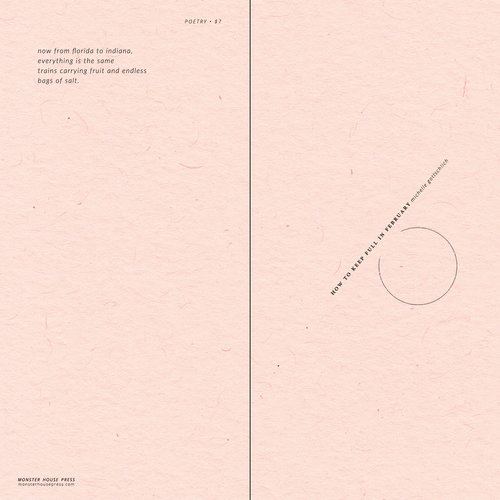|
How to Keep Full in February by Michelle Gottschlich (Released by Monster House Press, 2017)
Review by Greg Bem (@gregbem) Casual periphery: Sound Sun Pleasure!! by Sun Ra with a splash of water, the red, at best, begins to thin. but it’s me too, thinning, nearing my clearest, like adding salt to water, a kind rolling boil starts and all my thoughts quietly let go. (from “stress, cleaning”) Michelle Gottschlich writes transitory poems. These poems deface dualism, embracing the wide arc of knowing and defining, calling understanding inward, and then: expulsion. In How to Keep Full in February, a landscape of the Midwest is a zone of reimagination. There is certainty presented as the root of the metaphor. A certainty of image, common but mysteriously out of reach and intrinsically personal. Of typing and typology. What we all know but all know differently. Of truisms and a collective, matter-of-fact presence of culture. But one that is niche and of the poet’s life. The poems in this pamphlet, like arrows splicing open the image, form the dimension excising the binary and bringing it into a context of new, emergent, lively reality. Poems here that are drawn strings. Poems that are imaginations. Poems that are dreams. Poems that are acts of recreating one’s world as it has happened, continues to happen, and will happen. Gottschlich’s work is assembled here, in a typographic angle as incising and minute as the unique and curious images themselves, for quick and rapid escalation, to quick and rapid release. Here is a sequence appearing brief but is in fact bold, enduring, daring, and relentlessly available, here is poetry that cries of body, of world, of the wavering, quivering tensions of identity. [. . .] Hey, I’ll show you, here’s me eating a lavender cupcake and wiggling around the quiet kitchen, stepping on a grape, freezing a mouse mid-nibble. Here’s me. (from “jupiter”) The ideas that form who we are come forward in these poems like flames bringing light. It is like a gift. What we call ourselves, and what we relate to, what we know and abstractly utilize to understand ourselves better, understanding how we each operate and function. From poem title to poem title there is organic matter: representation of life, representation of decay, representation of the vulgar, grotesque transformation of the self. Food. Consumption. Health. Humanity. These broad headings lead to themes of tension, mesmerization, and subtly intimate awareness. Gottschlich writes line by line like naturally formed steps across cliff or coast, but jutting too, a literary syncopation of unexpected rhythm. A challenge to some, a burden to others, a definite mastery of experimentation and again with the subtle: in this case, the fragments of near-rhyme, alliteration, consonance, assonance, and all other manners of sonic embodiment. But never disembodying the other qualities of these very narrative and sometimes lyrical, always-musical works. The reader only needs to slow down to allow this poet’s dramatic undertones to rise to the surface. Like walking slower down a forested path, the details emerge in vibrancy through a quiet and a calm. or maybe i don’t know how to begin to just start moving forward the way they can as if on a glass road with none of this guttural and messy traction. (from “the saint of auscultation”) Most importantly, and a quality at risk of being overlooked by the common read either quick or slow, there is a setting in place here, in this book, of exquisite attention. This observed presence, this omniscience, is so powerful as it’s matched with moments of absolute concision, as described above. The poet brings a very powerful level of poetic play to the work, unquestionably beyond pretention. It is through this exploratory current that the book’s vision carries forth those qualities of the personal, the spectrum of the stories of life and potential life. Gottschlich’s craft matches the whirlwind of experience shot across these pages, binding them to one another. Entrancing and filling, this book is only an early step for a writer whose work illustrates and describes in an elegant and ecstatic space. I sit here and imagine how others will read them, and think about how I will reread them, these poems, and see further in my own craft. i feel everything i want growing out of an unswallowable stone. (from “avocado”) Note: In the recorded reading of this review, I use the word "pamphlet" in error. This work is not part of the publisher's pamphlet series, but rather the chapbook series.
0 Comments
Your comment will be posted after it is approved.
Leave a Reply. |
Welcome to Yellow Rabbits. Thanks for visiting.
All reviews by Greg Bem unless marked otherwise.
SearchYellow Rabbits Reviews
Archives by Month
August 2019
|

